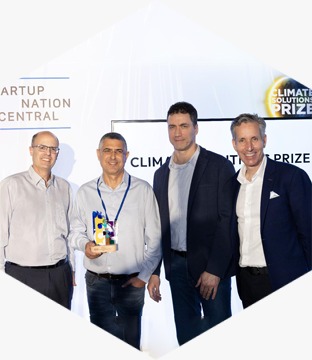The drive to reduce carbon emissions is nowhere more acute than in the world of industrial process heat. As a major contributor to global emissions, thermal energy generation is a target for decarbonization.
In this article, we will explore the benefits of implementing renewable thermal energy sources, such as solar-thermal technology and heat electrification, as well as storage methods. We will also take a look at how the market is responding to the emergence of these technologies.

Why renewable thermal energy is a critical priority for industry
Traditionally, thermal energy has relied heavily on fossil fuels, especially in industrial settings, 74% of all industrial energy used is for heat. One third of global energy is used for industrial applications. Transitioning to more sustainable methods of heat generation is therefore an urgent priority for moving the dial on global decarbonization efforts. Thankfully, technological innovations have put this transition within reach. There are now several methods available to replace fossil fuels for generation of heat energy for industrial processes.
Solar-thermal systems: harnessing the sun’s energy
Solar-thermal systems are at the forefront of generating renewable thermal energy. These systems utilize the sun’s rays to heat fluids or air, which can then be used for various applications. Solar collectors capture sunlight and convert it into heat energy. This energy can be stored or used directly for space heating, water heating, and even – thanks to recent technological advances – higher temperature industrial processes.
Heat electrification: where efficiency and sustainability meet
Heat electrification, another vital aspect of renewable thermal energy, involves the use of heat pumps to efficiently generate and transfer heat. Heat pumps harness heat from sources with low temperatures, such as the ambient air or geothermal energy stored in the ground, and upgrade the temperature by compressing refrigerant gas.
Notably, heat pumps have impressive efficiency ratios. For instance, for every kilowatt-hour (kWh) of electricity consumed, heat pumps can frequently generate four kWh of heat energy. This 4:1 ratio means that the additional three kWh of energy is considered renewable energy. Heat pumps powered by renewable energy are able to emit far less carbon than other methods. These advantages are driving record sales of heat pumps, with the International Energy Agency predicting annual sales of 7 million by 2030 in the EU alone. New heat pump technologies have evolved over the past couple of years that make them highly suitable for industrial temperatures and applications.
Industrial applications: unlocking the barriers to scale
Renewable thermal energy is no longer limited to small-scale applications. Industries are now adopting new technologies and devices to harness this clean and efficient energy source. As the technology has matured, it is now possible to achieve high-temperature requirements for various commercial applications. For instance, temperatures exceeding 130°C or even 150°C can be achieved using renewable thermal energy, opening up possibilities for industrial processes that were traditionally reliant on fossil fuels.
At TIGI, we specialize in designing and implementing cutting-edge turnkey heat generation and storage with cloud controlled solutions that enable industries to transition to sustainable heating practices. By leveraging state-of-the-art technology, we enable our customers to reduce their carbon emissions while improving their operational efficiency – the win/win scenario that companies need in order to successfully transition away from fossil fuel reliance without compromising on productivity or escalating costs.
Renewable heat: the key to a more sustainable future
The transition from combustion-based heating systems to electric-based alternatives is already playing a crucial role in achieving vital carbon reduction goals. Heat pumps, solar thermal collectors, and thermal storage are finally paving the way to a significant reduction in direct combustion of fossil fuels for heating purposes.
This welcome shift not only reduces carbon emissions, but also enhances energy efficiency while reducing energy costs and it minimizes local air pollution, enabling businesses to align their commercial interests more closely with their environmental and sustainability goals.
Contact our team today to learn more about TIGI’s comprehensive solutions for commercial and industrial applications.







